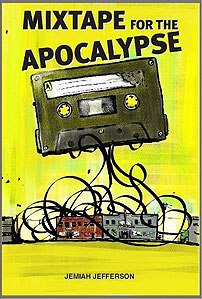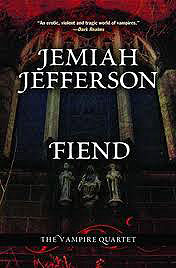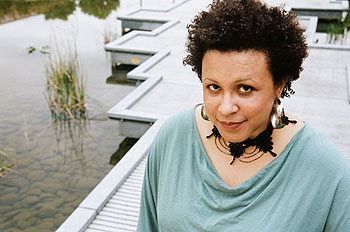Mixtape For The Apocalypse: An Interview With Author Jemiah Jefferson
Published on September 29th, 2011 in: Books, Feminism, Halloween, Horror, Interviews |By Lisa Anderson
With electronic books pulling ahead of paper books in popularity, self-publishing is getting easier and easier. One of the pioneers on this new frontier is Dark Horse comics editor and Popshifter contributor Jemiah Jefferson. Jemiah and I met up over IM to discuss her recently self-published novel, Mixtape for the Apocalypse, as well as her previous work.

Popshifter: Thank you for joining me this afternoon.
Jemiah Jefferson: My pleasure.
Popshifter: Now, you’ve described your new novel, Mixtape for the Apocalypse, as a Young Adult (YA) novel. How is it similar and different from other YA literature?
Jemiah Jefferson: I confess that I haven’t read almost any of the new wave of YA books, which friends have assured me are a lot more raw and “adult” than they were before. The main difference between what Mixtape is, and what I understand YA to be, is that my characters are actually young ADULTS, in their early twenties, a few years after they’ve graduated from college. They’re not in school, and I associate YA with high school or early-college-aged central characters.
Popshifter: You’re written before that you’ve had the idea for Mixtape for over 13 years. Can you tell us a little bit of what it’s about?
Jemiah Jefferson: I actually wrote the first “draft” 13 years ago, in what must have been late winter/early spring 1998. Shortly after that time I had unexpectedly gotten a literary agent, who sold Voice of the Blood to Leisure Books, and so I sent the manuscript to him. His response was “This is unpublishable.” When I asked him to elaborate, he not only didn’t answer me, he never contacted me again! I was going through a lot of difficult stuff in my life right around then, too, so I set the Apocalypse manuscript aside and did nothing with it it for several years.
Last year, though, in fall of 2010, I was embroiled in a lot of drama with Leisure, and I was desperate to get some kind of material out into the world. The manuscript originally entitled “My Little Golden Book of the Apocalypse” was DONE, so I thought, Oh, I should do everything I can to get this book released. And I thought it’d be faster if I self-published it . . . as well as still being concerned that my fly-by-night agent was right, and that no publisher would touch it.
Popshifter: Did it require a lot of revision, having been put aside for so long? Do you feel like you’re a different person, and a different writer, now?
Jemiah Jefferson: It didn’t actually require much revision at all. I definitely am a much, much better and stronger writer now than I was then, and I thought it’d be to the novel’s benefit for me to go through it and improve it, but it really didn’t need much at all. The current finished manuscript is at least 95% what I originally wrote. I wanted to kind of respect it, as it is kind of a time capsule not only of a particular time in my life, but of Portland in 1997. It’s a very different world now.
Popshifter: Correct me if I’m wrong, but based on what I’ve read from you about it, it seems to have a semi-epistolary format, with journals and other hand-written portions, and a track list that provides the structure. What can you tell us about that?
Jemiah Jefferson: It is very much based around the structure of one of my favorite books, Harriet the Spy, with a combination of narrative and diary entries, where the central character just gets to let loose and give forth opinions that he could never say out loud. It’s about 50/50 journal entries and the main character’s recollections of what else was going on at the time to try to place the journal entries in context.
Also, the main character, Michael Squire, is a big music fan, as I and all of my friends were at the time (a majority of us still are, but some people really kind of put that aside), and there are a lot of songs mentioned and quoted throughout. I went through and noted every single song that is mentioned in the novel and created a “track list,” but I actually do that with every single novel that I write. It’s just much more explicitly tied to Squire’s life and emotional state. There’s a mixtape of every single novel that I’ve ever written: some of them I actually created and shared, but generally, not really. I don’t really share them very much because they don’t seem to be that important to most readers! Or I should say “for” every novel I’ve written, sometimes with the music that’s mentioned in the story, and sometimes just the songs that capture the mood of certain passages.
Popshifter: What would you say have been the most challenging and most rewarding parts of self-publishing this time?
Jemiah Jefferson: Oh man, where do I start?
Popshifter: (laughs)
Jemiah Jefferson: Well, it was especially awesome to get my friend Ben Bittner to do the cover art, because I LOVE his work so, so much. He is the only person who I ever considered to do a cover, and the image he created is startlingly perfect. I’m also pleased to get the chance to learn about self-publishing in a hands-on fashion . . . even if it is maddeningly frustrating sometimes.
Popshifter: It’s my impression that a lot of the new, more “raw” YA is speculative fiction, such as horror, fantasy, and sci-fi, and I know that you’ve written in those genres. Does Mixtape have any of those elements?
Jemiah Jefferson: Mixtape has pretty much no genre elements, unless one considers very dark comedy a genre. I love genre fiction, but it’s not actually what I’ve written most of the time.
Popshifter: You mentioned that Mixtape was like a time capsule of Portland in ’97. Setting seems to play an important part in a lot of your work. How would you say that you’re inspired by the places where you’ve lived or visited, and what are some other examples?
Jemiah Jefferson: Setting is very important to me because plot isn’t so much my strong suit; I write about characters and emotional arcs, and the places the characters occupy can become characters themselves. Portland has been very inspirational because it’s not just beautiful, it’s also bizarre and spooky and steeped in all kinds of dark history. I’m originally from Denver, which has its own character, but not yet one that I’m interested in writing about. I’ve also lived in San Francisco and Seattle, and both of those places show up in my writing with particular emotional signatures.
I’ve never lived in New York, but I’ve been obsessed with it since I was a little kid, and I write fiction set there almost more than anywhere else. Portland, in a lot of the things I’ve written about, is like a goal, or a reward; it’s where characters come home, or have to leave with their tails between their legs. That’s very much how I feel about it, too.

Popshifter: Since we’re looking toward Halloween now, let’s discuss your Vampire Quartet for a moment. What other vampire works inspired you, and how would you say that your vampires are different from others we’ve seen in the past few years?
Jemiah Jefferson: I had a lot of influences throughout my life, having been a vampire fan since I was a kid and saw Love at First Bite somewhere. I was influenced heavily by Anne Rice and Poppy Z. Brite, out of frustration if nothing else. I was also heavily influenced by movies, particularly the sexual menace of The Lost Boys and Near Dark, and later by my favorite vampire film, Nadja.
My vampires are a bit different from the ones that have become very popular recently if only because they are more realistic characters in realistic settings. Romance is a major aspect of their lives, as is killing and immortality, but it is only an aspect, and never the whole point. They’re not idealized characters, really, even if the majority of them are extremely good-looking. They’re screwups, they’re insecure, they do the best they can with what they have. And things don’t always turn out well. They’re “human,” as it were.
Popshifter: Love at First Bite was one of my early favorites as well! Lots of fun. Have you got anything bubbling right now in terms of reviews or nonfiction writing?
Jemiah Jefferson: Then again I haven’t had much experience with the recent vampire phenomenon. The Twilight phenomenon really emotionally scarred me. I don’t know why; the world is what it is, and people like what they like. I’ve been really avoiding media criticism lately because of doing Mixtape but I’d like to check out some recently released books, and some of the more intriguing fall and winter movies. I’m much more interested in getting back to writing the erotic novel that I’ve been working on for the last two years! I’m kind of a fiction-writing beast, and that’s where I want to spend most of my energies if I can.
Popshifter: I was about to ask about that! I know that one of your first published works was a collection of erotic short stories. Does Mixtape have any of those elements?
Jemiah Jefferson: Mixtape does have a romance in it, and I almost never write anything that doesn’t have some sex scenes in it (which is why criticism is so boring!), and I heard from a few of my readers that the sex in Mixtape is extremely hot. Which is good; I’d hate to unleash a really lame, boring scene. I’ve got a reputation to uphold! On the other hand, Mixtape is not specifically erotic, though there is frequent and regular mention of sex, which makes sense for being in the mind of a 23-year-old guy, being SET in the mind of a 23-year-old guy I should say.
Popshifter: Makes sense. Well, I won’t keep you for much longer; I know you have things to do. But, once again in the spirit of Halloween, I’d like to hand you a crystal ball for a second. Are there any observations or predictions you’d like to make about vampires in popular culture, YA lit, electronic publishing, or self-publishing?
Jemiah Jefferson: I think vampires are going to go away in films for a little while, and continue to be a strong presence on the TV, which is great; I’m all for it, even if I haven’t been watching almost any of the vampire shows recently . . . YA is going to continue to be strong, as young people are both more easily influenced by their peers to pick up and read something, and have more time to read. E-publishing and self-publishing are going to keep blowing up; there are tens of thousands of titles that were put out in the last couple of years. Along with that I think we’ll see even more badly formatted self-pub and e-pub books. That’s part of what’s taking me so long on Mixtape; I have standards and as both a professional editor and proofreader, errors leap off the page at me, and I’ve stopped reading relatively interesting books because they had too many errors!
Popshifter: I’ve actually had the same experience! But I’ll be looking forward to Mixtape, and I thank you for your time today!
Jemiah Jefferson: Thank you for a good interview—and for your patience [with technical difficulties]! The internet can suck it.
Popshifter: (laughs) No doubt!

Jemiah Jefferson was born in Denver, Colorado. Her childhood consisted of a steady diet of AM radio, New Wave and disco, music videos, Star Wars, horror movies, voracious and indiscriminate reading, and hours of daydreaming. All of these influences can still be found in her writing. She currently lives in Portland, Oregon. You can keep with with Jemiah on her Facebook author page or at Jemiah.com.
Mixtape For The Apocalypse is available for Kindle from Amazon. The Vampire Quartet was recently released in e-book and redesigned trade paperback format and is also available from Amazon.
Time limit is exhausted. Please reload the CAPTCHA.